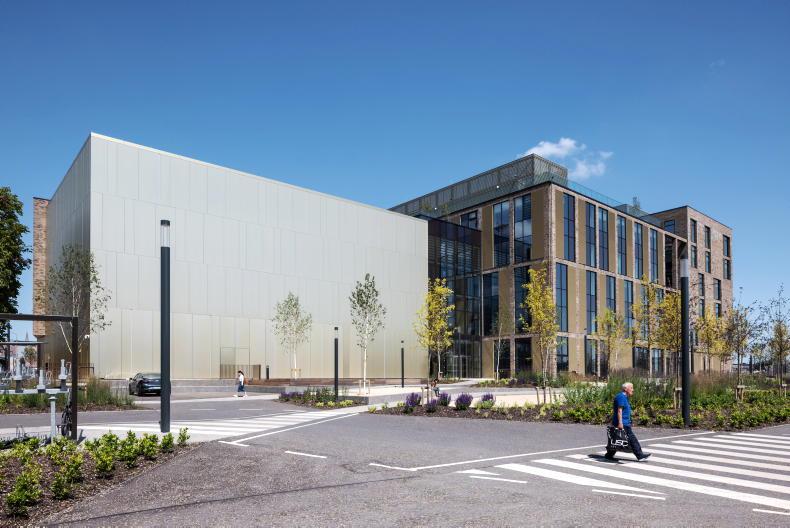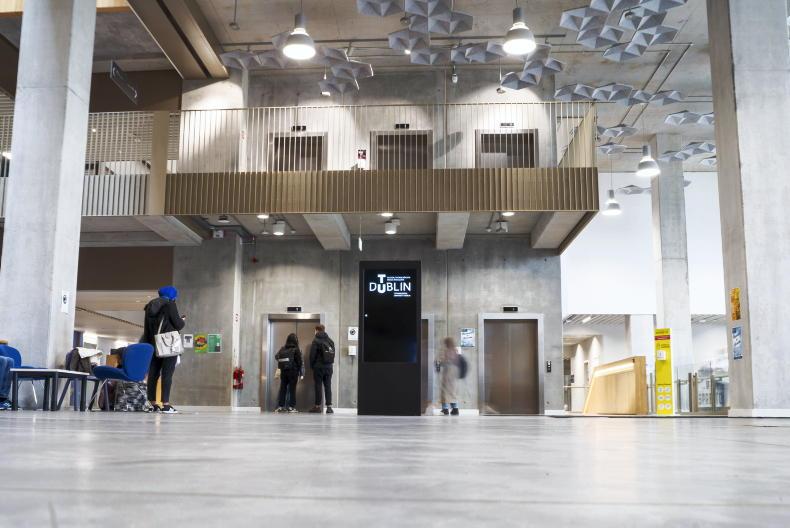Now that all five planned technological universities in Ireland have been established, you’re likely going to be seeing some changes in CAO lists, course codes and the names of certain colleges. Is it confusing? Not if you have all of the facts.
For the month of July, Irish Country Living will be lifting the lid on each of the five technological universities, providing the need-to-know practical information, as well as new courses, programmes and the benefits these universities will bring to their regions.
Last week, we started the series with a focus on Atlantic Technological University (ATU), which was recently established in April, 2022. This week, we focus on Ireland’s first technological university: Technological University Dublin (TU Dublin).
Showing its value
First established in 2019, TU Dublin is now a well-known fixture on the CAO points list. As with other Irish technological universities, it was established to address the changing post-secondary educational needs of its region. Lisa Saputo, communications manager at TU Dublin, says as Ireland’s first technological university, they have been eager to show the positive economic and societal impacts such a university can provide.

The East Quad at TU Dublin.
“Much like our legacy institutions, TU Dublin is deeply embedded in its region; forging strong partnerships with industry, governmental and community organisations to deliver educational programmes which will prepare students for the workplace of tomorrow.”
The university’s 10-year strategic plan (to 2030) focuses on three pillars: people, planet and partnership. They have appointed an executive team (including a vice-president responsible for each of the three pillars) to help achieve the goals set out in their plan.
Additionally, the new organisational design groups TU Dublin into five separate faculties: arts and humanities; business; computing, digital and data; engineering and built environment and science and health.
Quality and variety
TU Dublin prides itself on its strong focus in all Science, Technology, Engineering and Maths (STEM) disciplines (making them a great option for budding engineers), but the university is also home to the largest cohort of students in the fields of business, media, culinary arts and the creative and performing arts in Ireland.
While each course is approached with a technological angle, TU Dublin places equal importance on sustainability and environmental education.
“Our students also learn to consider the human impact of new technology – from driverless haulage trucks to the depletion of natural resources as required to produce the latest consumer technologies,” Lisa says.

The central quad at TU Dublin.
“With our eye firmly on the future of our planet, our innovative education model embeds sustainability as a learning outcome in all of our programmes – from apprenticeship to PhD – producing responsible, sustainably minded graduates in many economically crucial sectors.”
In demand
Since its induction, TU Dublin’s enrolment figure has steadily increased to the over 30,000 students it educates today. The university works with new techniques and models to provide up-to-date and inclusive post-secondary options. Lisa says TU Dublin is reimagining a new way of learning and teaching in higher education.
“The learner experience is central to the TU Dublin education model and will revolutionise how students move to and through higher education,” she explains.
“TU Dublin plans to offer more flexible and appropriate modalities of education, including Face-to-Face, HyFlex, On-Demand and real-time online.
“Our key is that the modality used will be based on the most value-added and transformative educator-learner experience.”
Course options
TU Dublin has invested in its infrastructure in the past few years and its culinary arts facilities are particularly impressive. For those interested in studying hospitality, the university offers a full range of culinary and hospitality management courses, including some with industry partnerships which show the full breadth a degree in hospitality can provide.
“TU Dublin has a range of programmes in hospitality, culinary arts and tourism from level 6 to PhD level,” Lisa says.
“For example, the BA (Hons) in Botanical Cuisine is a new unique culinary arts course delivered on our Tallaght Campus and is the first degree of its kind in Europe. It is aimed at producing contemporary chefs to meet the rapidly changing trends in food and to creatively and confidently innovate plant-based food production and service.”
For those more interested in the food production side of things, they also provide a unique offering in horticulture, which is delivered on the university’s Blanchardstown campus.
“The course is designed for students that wish to make a sustainable, positive impact on the environment; to respond to growing concerns about the quality of our food and the environmental cost of its production.”
tudublin.ie
Which colleges have combined
to create this university?
Dublin Institute of Technology.Institute of Technology Blanchardstown.Institute of Technology
Tallaght.
Student population
Over 30,000.
Available courses
TU Dublin offers a full range of offerings, including full-time, part-time, apprenticeship and postgraduate courses.
Accommodation
TU Dublin does not have on-campus accommodation. It does, however, have an accommodation team who are available to help students find housing suited to their needs and budget.
TU Dublin has block-booked 600 places in various accommodation styles this year, with costs starting at €155 per week for a twin room. Ensuite rooms range in price from €233 to €258 per week for a premium ensuite room. There is still some capacity available in these student hubs and they also have several vacancies for host families or digs, which is another economical and flexible option (typically €165 per five-day lease including utilities).
Now that all five planned technological universities in Ireland have been established, you’re likely going to be seeing some changes in CAO lists, course codes and the names of certain colleges. Is it confusing? Not if you have all of the facts.
For the month of July, Irish Country Living will be lifting the lid on each of the five technological universities, providing the need-to-know practical information, as well as new courses, programmes and the benefits these universities will bring to their regions.
Last week, we started the series with a focus on Atlantic Technological University (ATU), which was recently established in April, 2022. This week, we focus on Ireland’s first technological university: Technological University Dublin (TU Dublin).
Showing its value
First established in 2019, TU Dublin is now a well-known fixture on the CAO points list. As with other Irish technological universities, it was established to address the changing post-secondary educational needs of its region. Lisa Saputo, communications manager at TU Dublin, says as Ireland’s first technological university, they have been eager to show the positive economic and societal impacts such a university can provide.

The East Quad at TU Dublin.
“Much like our legacy institutions, TU Dublin is deeply embedded in its region; forging strong partnerships with industry, governmental and community organisations to deliver educational programmes which will prepare students for the workplace of tomorrow.”
The university’s 10-year strategic plan (to 2030) focuses on three pillars: people, planet and partnership. They have appointed an executive team (including a vice-president responsible for each of the three pillars) to help achieve the goals set out in their plan.
Additionally, the new organisational design groups TU Dublin into five separate faculties: arts and humanities; business; computing, digital and data; engineering and built environment and science and health.
Quality and variety
TU Dublin prides itself on its strong focus in all Science, Technology, Engineering and Maths (STEM) disciplines (making them a great option for budding engineers), but the university is also home to the largest cohort of students in the fields of business, media, culinary arts and the creative and performing arts in Ireland.
While each course is approached with a technological angle, TU Dublin places equal importance on sustainability and environmental education.
“Our students also learn to consider the human impact of new technology – from driverless haulage trucks to the depletion of natural resources as required to produce the latest consumer technologies,” Lisa says.

The central quad at TU Dublin.
“With our eye firmly on the future of our planet, our innovative education model embeds sustainability as a learning outcome in all of our programmes – from apprenticeship to PhD – producing responsible, sustainably minded graduates in many economically crucial sectors.”
In demand
Since its induction, TU Dublin’s enrolment figure has steadily increased to the over 30,000 students it educates today. The university works with new techniques and models to provide up-to-date and inclusive post-secondary options. Lisa says TU Dublin is reimagining a new way of learning and teaching in higher education.
“The learner experience is central to the TU Dublin education model and will revolutionise how students move to and through higher education,” she explains.
“TU Dublin plans to offer more flexible and appropriate modalities of education, including Face-to-Face, HyFlex, On-Demand and real-time online.
“Our key is that the modality used will be based on the most value-added and transformative educator-learner experience.”
Course options
TU Dublin has invested in its infrastructure in the past few years and its culinary arts facilities are particularly impressive. For those interested in studying hospitality, the university offers a full range of culinary and hospitality management courses, including some with industry partnerships which show the full breadth a degree in hospitality can provide.
“TU Dublin has a range of programmes in hospitality, culinary arts and tourism from level 6 to PhD level,” Lisa says.
“For example, the BA (Hons) in Botanical Cuisine is a new unique culinary arts course delivered on our Tallaght Campus and is the first degree of its kind in Europe. It is aimed at producing contemporary chefs to meet the rapidly changing trends in food and to creatively and confidently innovate plant-based food production and service.”
For those more interested in the food production side of things, they also provide a unique offering in horticulture, which is delivered on the university’s Blanchardstown campus.
“The course is designed for students that wish to make a sustainable, positive impact on the environment; to respond to growing concerns about the quality of our food and the environmental cost of its production.”
tudublin.ie
Which colleges have combined
to create this university?
Dublin Institute of Technology.Institute of Technology Blanchardstown.Institute of Technology
Tallaght.
Student population
Over 30,000.
Available courses
TU Dublin offers a full range of offerings, including full-time, part-time, apprenticeship and postgraduate courses.
Accommodation
TU Dublin does not have on-campus accommodation. It does, however, have an accommodation team who are available to help students find housing suited to their needs and budget.
TU Dublin has block-booked 600 places in various accommodation styles this year, with costs starting at €155 per week for a twin room. Ensuite rooms range in price from €233 to €258 per week for a premium ensuite room. There is still some capacity available in these student hubs and they also have several vacancies for host families or digs, which is another economical and flexible option (typically €165 per five-day lease including utilities).









 This is a subscriber-only article
This is a subscriber-only article










SHARING OPTIONS: